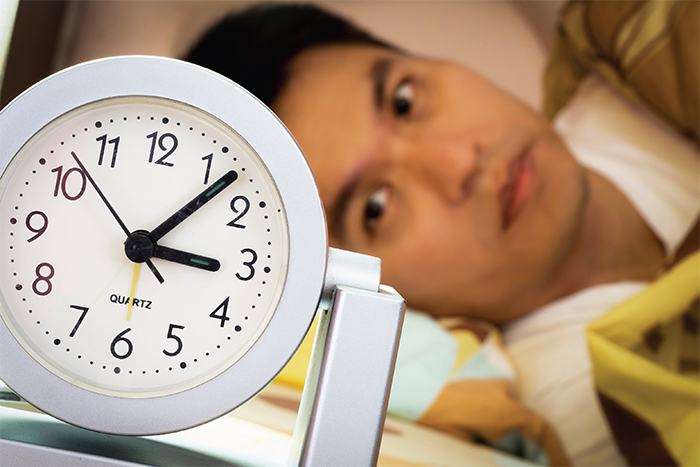A wake up call
In Conditions
Follow this topic
Bookmark
Record learning outcomes
A good night's sleep is essential for health, experts tell us, while warding off stress is an important part of protecting ourselves from illness. But this can be easier said than done.

Not getting enough sleep has been described as a serious public health issue, with a lack of sleep being linked to a range of conditions, from heart disease to depression. Leading sleep experts from UK universities told the BBC recently that society has become €supremely arrogant€ in ignoring the importance of sleep. By burning the candle at both ends and pushing our waking hours deeper into the night, we are going against millions of years of evolution and causing problems for our health, it seems.
€Sleep is as important as diet and exercise when it comes to the nation's health,€ agrees Lisa Artis of The Sleep Council. €However, research shows that we just aren't getting enough sleep and it is slipping down people's list of priorities. It seems that modern life is just too demanding €“ and too exciting €“ to switch off from.€
The results of The Sleep Council's Great British Bedtime report last year showed that a third of people get by on just five to six hours' sleep a night. But Dr Michelle Miller, a reader of biochemical medicine at the University of Warwick, says that studies suggest €the optimum amount of sleep associated with the best mental and physical health is, for adults, between seven and eight hours per night and, for children and adolescents, around eight to 10 hours a night€.
Persistently ignoring the body's need for sleep has worrying implications for health, a look at the research reveals. €Our meta-analysis of prospective studies,€ says Dr Miller, €has shown that short sleep [meaning, in general, less than six hours] is associated with a 12 per cent increased risk of all-cause mortality, a 28 per cent increased risk of diabetes, a 48 per cent increased risk of coronary heart disease and a 15 per cent increased risk of stroke.€ It makes good sense that we shouldn't ignore our body's need for sleep €“ all animals sleep, with humans being no exception. And while there is still much that scientists don't know about what happens during sleep, its importance for health is revealing itself in figures such as these.
€Research clearly demonstrates that sleep is a dynamic process that is important for good physical and mental health,€ says Dr Miller. €It is important for restoration of the body, fighting infection, memory consolidation and brain development.€ Researchers are busy exploring the mysterious world of sleep, trying to discover what it is about a lack of sleep that seems to be detrimental to health. Research carried out at the University of Surrey, for instance, found that as little as one week of inadequate sleep was enough to alter the activity of hundreds of human genes, including those linked to controlling immunity and responding to stress.
Scientists are also starting to refute the long-held belief that it is possible to make up for lost sleep by catching up on it at a later date. Recent research carried out at the University of Pennsylvania in the US and published in The Journal of Neuroscience, for instance, suggests that regularly losing out on sleep may lead to permanent loss of brain cells. As well as worries about the impact on long-term health, lack of sleep affects day-to-day quality of life too. €Lack of sleep affects mood, concentration and alertness,€ points out Lisa. €Sleep affects our learning and problemsolving capabilities. The more REM sleep we have [Rapid Eye Movement sleep €“ the type where the brain becomes very active, but the body very still], the easier it is to retain things learned the day before. If sleep deprivation mounts up, people start getting sleepy during the day; they find it more difficult to make decisions; they make more mistakes, and they have shorter tempers and slower reflexes and so on.€
Elusive sleep
Cutting back on sleep because of busy lives is one thing, but many people experience insomnia €“ either struggling to get to sleep when they want to or not being able to stay asleep for long enough to feel refreshed the next day. Figures from the Mental Health Foundation suggest that 30 per cent of the UK population suffer from insomnia or another sleep disorder €“ totting up to millions of sleepless nights across the country.
€Almost all of us probably suffer insomnia at some point in our lives €“ sometimes for a short period, often chronically,€ says Lisa. €Stress, worry, busy lifestyles, our addiction to gadgets and no switch-off time all play their part. We know we need sleep, we know how wretched we feel when we don't get enough, but we don't know enough about how to improve sleep and there's a lack of public funds and initiatives focused on creating more awareness and providing helpful advice.€
Some people are more prone to insomnia than others. €There is a psychological type who are more likely to develop insomnia than others,€ says Professor Kevin Morgan of the Clinical Sleep Research Unit at Loughborough University. However, the big division is age and gender. €Older people are more likely than younger people to have insomnia and more women than men experience insomnia,€ adds Professor Morgan.
Discovering what might be causing a person's insomnia is an important first step, whether it be a health condition, stress or anxiety. Sleep hygiene advice should also be followed to help optimise a person's chances of getting a good night's shut eye.
Sleep hygiene tips from Dr Miller include: €Maintaining a regular sleeping pattern; avoiding caffeine; sleeping in a dark room; winding down before sleep, and avoiding the use of digital screens that emit blue light in the evening€. Other tips include avoiding eating heavy meals late at night and having a comfortable bed. If a person has longer-term insomnia €“ lasting more than four weeks €“ a GP may consider cognitive and behavioural treatments. A short course of sleeping tablets may also be considered, although it is not recommended that these are taken long-term.
About 11 million prescriptions for sleeping tablets are written in the UK every year and Professor Morgan has recently been involved in a project aimed at trying to reduce this number by improving access to cognitive behavioural therapy (CBT) for people with insomnia. €The current prescription figure means that there are a lot of drugged sleeps happening out there,€ he says.
He and colleagues have been looking at methods which deliver effective CBT for insomnia to NHS patients. €We have worked on face-to-face therapy methods; self-help methods; digital methods, and delivering treatment advice over the internet. These are all effective ways of treating insomnia,€ he explains.
He says that all GPs in England have direct access to Improving Access to Psychological Therapies (IAPT) services and that these services can deliver CBT. €These IAPT services are relatively new and not all doctors even know they have them,€ says Professor Morgan. €GPs tend to think of IAPT as depression services, but there are lots of things that IAPT practitioners can do that don't involve treating mental health issues €“ insomnia being one of them.€
Hypnotic drug therapy should only be considered after behavioural approaches have been taken into account and it must be accompanied by sleep hygiene advice, he says.
 Burning the candle at both ends can cause problems for our sleep patterns and health
Burning the candle at both ends can cause problems for our sleep patterns and health
30 per cent of the UK population suffer from insomnia or another sleep disorder
Stress alert!
Insomnia is a problem that can be tightly interlinked with stress. Indeed, finding which one causes the other can be a bit like trying to work out the old chicken and egg conundrum €“ which came first? Managing stress is important for anyone aiming to achieve good quality sleep. €Bad sleep is not only a symptom of stress; it is also a cause of stress,€ says Neil Shah, Director of The Stress Management Society and author of The 10-Step Stress Solution. €When stressed, our bodies might stop, but our brains still keep going. This can lead to disturbed sleep and can cause further stress the next day.€
Stress is also implicated in many health conditions. €Stress undoubtedly has a negative effect on health,€ says Neil. €The top killers in the world €“ cancer, heart disease and stroke €“ have all been linked to stress.€ Indeed, one study from Harvard that Neil refers to shows that between 60 and 90 per cent of visits to the doctor can be traced back to stress. €Stress supresses the immune system, which in turn predisposes us to medical illness,€ he explains.
Neil adds that stress is also thought to contribute to hypertension and high blood pressure; digestive conditions such as irritable bowel syndrome; asthma; chronic pain; allergies, and alopecia €“ all problems which pharmacy staff deal with on a day-to-day basis. Recognising the symptoms of stress €“ and these are many and varied €“ is essential. €Ignoring stress symptoms can lead to the situation spiralling out of control and end in a person completely breaking down, whether mentally, physically or both,€ says Neil. €Being proactive is always better than being reactive with regard to stress, so putting preventative measures into everyday life will be a lot easier in the long run.€
Neil suggests taking breaks, changing what can be changed and coming to terms with the things over which we have no control. Stress can also be caused by illness itself, and although this is unsurprising, it is important that the stress is dealt with as well as the health problem at the root of it. People with cancer or who experience chronic pain, for instance, often need support to prevent stress levels from rising. Stress can also make chronic pain, such as back pain worse because muscle tension caused by worrying can exacerbate the problem.
€Stress affects the immune system, so when we are stressed, our bodies will not be able to deal with pain and illness as well as it normally would,€ says Neil. €The illness or pain might not be treatable or manageable, but stress can be. Managing stress and eliminating it can allow the body to deal with the illness or pain better.€So how do people who are ill go about combatting stress?
There are good support groups in the community that can help. Maggie's, for instance, is a charity which provides free emotional as well as practical support for people with cancer, and there are now 18 Maggie's centres dotted around the country in the grounds of specialist NHS cancer hospitals. The aim is to work in partnership with NHS cancer clinical care, with a strong focus on wellbeing.L orrie Forsyth is a clinical psychologist and Centre Head for Maggie's in Lanarkshire. €Clinical teams don't necessarily have the time to help people with cancer deal with the emotional side of what they are going through, but we believe that it is very important that this is addressed,€ she says.
€People who have cancer go through different emotions at different stages,€ Lorrie explains. €When a person is first diagnosed with cancer, this can trigger lots of worry and uncertainty and they may well question the future and feel a lack of control. These emotions can all be significant in increasing stress levels. As people go through their cancer treatment, the physical impact of the treatment and a sense that their world has been shaken up can also cause stress levels to rise. And people may well need help to deal with their emotions once the treatment has finished and life has returned to 'normal'.€
Maggie's offers a number of different courses and workshops to help support people at different stages of cancer. €It is so important to deal with emotional wellbeing during and after cancer,€ says Lorrie. €Being stressed affects quality of life at a basic level. It feels awful to be consistently on the edge, always on the alert, waiting for the next piece of bad news and the next challenge to face. Over a period of time, this can become very draining.€
It can take its toll physically, too, she believes. €High levels of stress affect the immune system and the production of white blood cells and so it impacts on the body's ability to deal with infections. Stress can also affect behaviours, such as alcohol consumption, smoking and diet choices €“ things we may choose to do that won't give us the best chance physically. Coping better with stress levels helps the body to cope better with cancer treatment.€
It is helpful for people to understand what stress is, as once they can recognise and understand the symptoms, it can help to put them back in control. €We give people some simple tools to help control stress,€ says Lorrie, €including breathing techniques and physical relaxation techniques.€ Meeting other people who are going through the same experience can really help people to cope better, too. Lorrie says: €One lady commented the other day that she had coped with the chemotherapy and the treatment, but that it was the emotional side of things €“ she pointed to her head as she spoke €“ which she found hard to deal with. And that's why we are here to help.€
 Insomnia and stress are tightly interlinked
Insomnia and stress are tightly interlinked
For more information on Maggie's Centres, visit: www.maggiescentres.org
